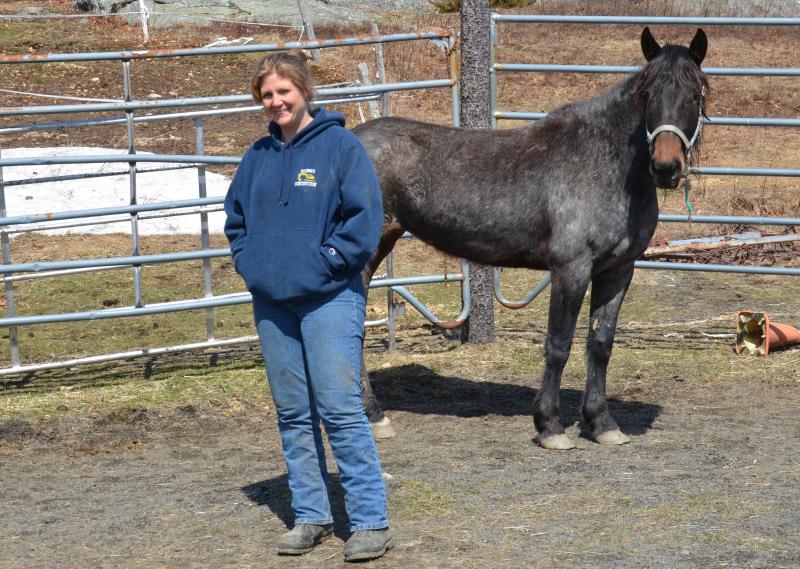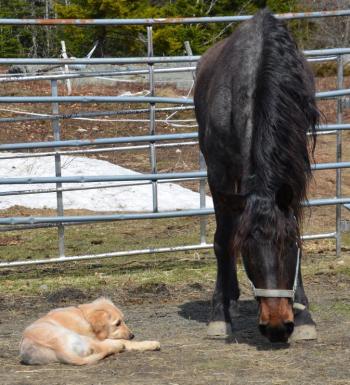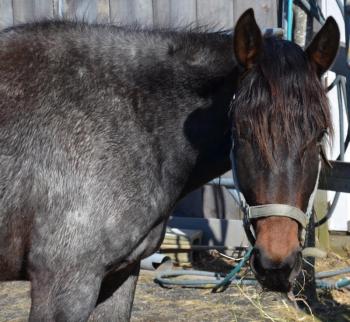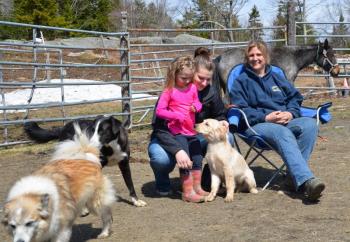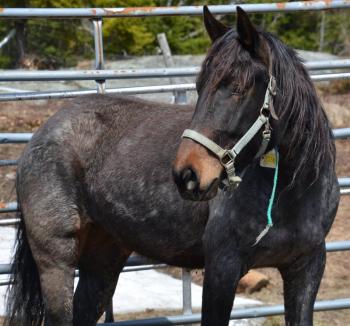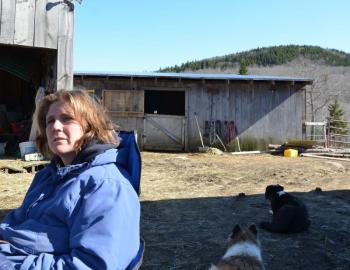HOPE — If you are looking for Wendy Harvey these days, she will likely be sitting in a lawn chair in the middle of the paddock, near the barns and pastures where her 11 horses are nibbling hay or peering over fences, wondering if you brought a treat.
But Harvey is intent right now on just one mare, a grey roan with a black mane and tail. Her mane is so knotted and snarled you want to reach over and brush it, but don’t. She is wild, and except for a brief harrowing time trapped in a livestock chute where a halter was slung over her face, she has never been touched by humans.
This is Harvey’s challenge: To touch this horse, to gentle her, and in the outdated parlance of horse talk, to break her in.
Except the latter is not Harvey’s approach.
She has been been training horses for the past 16 years, and has progressively incorporated techniques that respect the horse’s state of mind. There are no barbed bits and spurs in her repertoire, no bucking broncos and domination displays. Harvey aims for teamwork between human and horse.
With this wild roan, whom she calls Freedom, there is to be little stress. She knows the horse is already traumatized. The five-year-old mustang mare was forcibly herded out of her native landscape several weeks ago, rounded up with other mustangs, loaded into trucks, and shipped to various points around the country. The goal is to get them off the public lands in the west where they compete with cattle for grazing, and raise the ire of ranchers. Their fate might include getting shot, or captured and trucked to Mexico or Canadian slaughterhouses. That is the cold hard reality of being a wild horse in the U.S.
The alternative? Train, and try to find them caring homes. But first, it is about calming the horses down, and introducing the human touch.
So Harvey keeps a distance from this mustang, allowing the mare to come close to her, on her own time. In the two weeks she has been in Hope, the mare, whom Wendy calls Freedom, is slowly relaxing.
“She came closer the other day, reached toward my head, even lipped my hair,” said Harvey. “I didn’t move.”
She holds her hands up approximately two feet from the horse — “her bubble,” Harvey calls it. “And you can see her tremble.”
And when she eventually does touch the mare, she said: “I hope to get that stupid neck rope off of her. That’s my first goal.”
Wendy is owner and operator of Equine Connections, on Gillette Road in Hope, near the Camden town line. She has the mustang now because she applied to participate in the Extreme Mustang Makeover. The Extreme Mustang Makeover project is a collaboration of the Mustang Heritage Foundation, a Texas-based nonprofit, and the federal Bureau of Land Management. The Foundation is dedicated to getting the country’s wild horses and burros adopted, recognizing the value of their blood lines, and what it calls the “beauty, versatility and trainability of the rugged horses.”
According to the Foundation, there are approximately 36,000 free-roaming wild Mustangs and burros in 10 western states. Many are descendants of wild horses transported to the Americas by by Spanish explorers and missionaries in the 16th Century.
“More than two million wild horses and burros are reported to have roamed the west by the late 1800s,” the Foundation said. “By the early 1900s, competition intensified between wild horses and cattle, sheep, fences, farms, and ranches for the remaining open range. Wild horse population plummeted as tens of thousands of animals were rounded up for use as draft animals, saddle stock, military mounts, food or to reduce competition with domestic livestock for limited forage, water and space.”
In the 1960s, many were brutally rounded up and sold to rendering plants.
The Makeover project is just one of the Foundation’s events to showcase trainability. Makeovers are increasingly popular across the country, and not just with mustangs. Other horse rescue organizations use them in an attempt to save horses, whether from the wild or off the race track.
With the mustang Makeover, experienced trainers are chosen through an application process. They then travel to various states — Maryland, Texas, Nevada, and now Massachusetts — to meet the trucks loaded with the horses. It’s a crapshoot about which horse a trainer gets. In Harvey’s case, the roan was quickly herded through a chute and loaded in the back of her trailer. Harvey barely had time to look at her.
Trainers then return home and work for the next 100 days schooling the animal, introducing them to the halter and saddle. Then, the trainers and horses return to a central point and participate in a competition. The trainer of the horse that exhibits most progress wins a sizable amount of money.
After the event, the schooled mustangs are then auctioned and adopted. In 2012, through these various events, the Mustang Foundation saw 561 horses adopted.
Harvey’s particular competition, the Topsfield Extreme Mustang Makeover, has a purse of $20,000, and will be held Aug. 8 in Topsfield, Massachusetts.
Harvey caught wind of the Makeover via her stepdaughter, Ashley Harvey, who noticed on a Facebook feed the ad announcing the competition. Ashley is in the Navy and when she saw the ad, she was on duty in Bahrain. She immediately forwarded it to Wendy.
“I thought, if anyone can do it, it will be Wendy,” said Ashley, who is now stationed in Groton, Conn., training military canines.
The prerequisites are stringent. A trainer must have a facility that includes a round paddock with six-foot-high fences. The circular fencing eliminates the possibility of a horse getting caught in a corner, and feeling trapped. The training techniques must adhere to the Foundation’s humane treatment policies, and provide adequate health care.
And, there is no upfront money. It is a labor born of love for horses and appreciation of the plight of American mustangs, plus a good dose of pluck.
Wendy Harvey is taking on the expense of the training herself, including driving the seven hours to Orange, Mass., in mid-April to get her mustang, trailer her back to Hope, and feed her.
“When she first arrived she was so thin,” said Wendy. “Every one of her ribs were showing.”
By Day 7, Freedom’s name had evolved to Wind Dancer Freedom, and the mare was tolerating dogs in the paddock, little children, eating hay spiked with cut up carrots, and pricking her ears forward at barking dogs and humans talking and laughing.
In various pens around her, other horses were getting used to Freedom’s status. A paint peered around the side of the shed, while a gelding was worried his most favored status had diminished. Freedom nickered now and then, and lowered her head closely toward a bouncing golden retriever puppy.
On Sunday, April 19, a Reiki healer from Kennebunk arrived do energy work on Freedom. Her chakras was blocked, in shock, according to the healer.
That afternoon, Harvey’s priorities changed. While the training remains focused on saddling and bridling Freedom, there is a stronger emphasis on encouraging the horse’s spirit.
“I want her to feel safe with people, and not fear what is going to happen,” she said. “This is more important than the training. She doesn’t have a sense of purpose right now. I don’t know what her sense of purpose is going to be and I am hoping to help her find it.”
By mid-week, April 22, Freedom was eating her grain close to Harvey.
All horses have much to offer humans, said Harvey.
“I feel like we owe them something,” she said. “Yes, you have to fence them, but you don’t have to kill their spirit. If it is done well, I think this competition can help educate people.”
2015 Extreme Mustang Makeover Events
Date Event Location
March 27 - 28 Doswell, Virgina
April 24 - 25 Queen Creek, Arizona
May 15 - 16 Norco, California
May 29 - 30 Loveland, Colorado
June 20 - 21 Reno, Nevada
July 10 - 11 St. Louis, Missouri
July 24 - 25 Nampa, Idaho
August 7 - 8 Topsfield, Massachusetts
August 21 - 22 Gainesville, Georgia
Sept. 10 - 11 Fort Worth, Texas
Reach Editorial Director Lynda Clancy at lyndaclancy@penbaypilot.com


